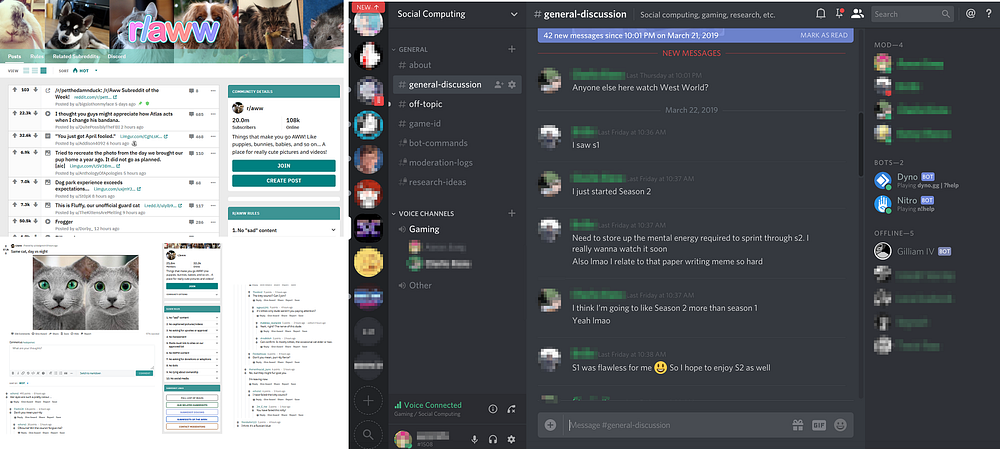Introducing new technology into a work place is often disruptive, but what if your work was also completely mediated by technology? This is exactly the case for the teams of volunteer moderators who work to regulate content and protect online communities from harm. What happens when the social media platforms these communities rely on change completely? How do moderation teams overcome the challenges caused by new technological environments? How do they do so while managing a “brand new” community with tens of thousands of users?

For a new study that will be published in CSCW in November, we interviewed 14 moderators of 8 “subreddit” communities from the social media aggregation and discussion platform Reddit to answer these questions. We chose these communities because each community had recently adopted the real-time chat platform Discord to support real-time chat in their community. This expansion into Discord introduced a range of challenges—especially for the moderation teams of large communities.
We found that moderation teams of large communities improvised their own creative solutions to challenges they faced by building bots on top of Discord’s API. This was not too shocking given that APIs and bots are frequently cited as tools that allow innovation and experimentation when scaling up digital work. What did surprise us, however, was how important moderators’ past experiences were in guiding the way they used bots. In the largest communities that faced the biggest challenges, moderators relied on bots to reproduce the tools they had used on Reddit. The moderators would often go so far as to give their bots the names of moderator tools available on Reddit. Our findings suggest that support for user-driven innovation is important not only in that it allows users to explore new technological possibilities but also in that it allows users to mine their past experiences to introduce old systems into new environments.
What Challenges Emerged in Discord?

Discord’s text channels allow for more natural, in the moment conversations compared to Reddit. In Discord, this social aspect also made moderation work much more difficult. One moderator explained:
“It’s kind of rough because if you miss it, it’s really hard to go back to something that happened eight hours ago and the conversation moved on and be like ‘hey, don’t do that.’ ”
Moderators we spoke to found that the work of managing their communities was made even more difficult by their community’s size:
On the day to day of running 65,000 people, it’s literally like running a small city…We have people that are actively online and chatting that are larger than a city…So it’s like, that’s a lot to actually keep track of and run and manage.”
The moderators of large communities repeatedly told us that the tools provided to moderators on Discord were insufficient. For example, they pointed out tools like Discord’s Audit Log was inadequate for keeping track of the tens of thousands of members of their communities. Discord also lacks automated moderation tools like the Reddit’s Automoderator and Modmail leaving moderators on Discord with few tools to scale their work and manage communications with community members.
How Did Moderation Teams Overcome These Challenges?
The moderation teams we talked with adapted to these challenges through innovative uses of Discord’s API toolkit. Like many social media platforms, Discord offers a public API where users can develop apps that interact with the platform through a Discord “bot.” We found that these bots play a critical role in helping moderation teams manage Discord communities with large populations.
Guided by their experience with using tools like Automoderator on Reddit, moderators working on Discord built bots with similar functionality to solve the problems associated with scaled content and Discord’s fast-paced chat affordances. This bots would search for regular expressions and URLs that go against the community’s rules:
“It makes it so that rather than having to watch every single channel all of the time for this sort of thing or rely on users to tell us when someone is basically running amuck, posting derogatory terms and terrible things that Discord wouldn’t catch itself…so it makes it that we don’t have to watch every channel.”
Bots were also used to replace Discord’s Audit Log feature with what moderators referred to often as “Mod logs”—another term borrowed from Reddit. Moderators will send commands to a bot like “!warn username” to store information such as when a member of their community has been warned for breaking a rule and automatically store this information in a private text channel in Discord. This information helps organize information about community members, and it can be instantly recalled with another command to the bot to help inform future moderation actions against other community members.
Finally, moderators also used Discord’s API to develop bots that functioned virtually identically to Reddit’s Modmail tool. Moderators are limited in their availability to answer questions from members of their community, but tools like the “Modmail” helps moderation teams manage this problem by mediating communication to community members with a bot:
“So instead of having somebody DM a moderator specifically and then having to talk…indirectly with the team, a [text] channel is made for that specific question and everybody can see that and comment on that. And then whoever’s online responds to the community member through the bot, but everybody else is able to see what is being responded.”
The tools created with Discord’s API — customizable automated content moderation, Mod logs, and a Modmail system — all resembled moderation tools on Reddit. They even bear their names! Over and over, we found that moderation teams essentially created and used bots to transform aspects of Discord, like text channels into Mod logs and Mod Mail, to resemble the same tools they were using to moderate their communities on Reddit.
What Does This Mean for Online Communities?
We think that the experience of moderators we interviewed points to a potentially important underlooked source of value for groups navigating technological change: the potent combination of users’ past experience combined with their ability to redesign and reconfigure their technological environments. Our work suggests the value of innovation platforms like APIs and bots is not only that they allow the discovery of “new” things. Our work suggests that these systems value also flows from the fact that they allow the re-creation of the the things that communities already know can solve their problems and that they already know how to use.
Our work has several more specific takeaways as well. For moderators and community leaders:
- Leaders of online communities planning to add an additional platform to host more discussion and social interactions for their community members should consider platforms with public APIs like Discord. You may run into challenges that the platform’s default tools are ineffective at solving, but public APIs allow for users to write software to solve their own problems.
For designers of online communities:
- Designers of social media applications and platforms that host online communities should consider the effects of community growth and large population sizes on the work of moderation teams, who are often unpaid volunteers with limited time and resources to manage their communities.
- Designers should also support a robust, public API for these applications and platforms. As our findings show, not every feature may be imagined in the creation of these platforms, but with a public API, users can drive the creation of custom solutions to unforeseen design problems. Our work suggests that these may be drawn from users unique knowledge of their problems as well as from their knowledge of existing solutions.
Both this blog post and the paper it describes are collaborative work by Charles Kiene, Jialun “Aaron” Jiang, and Benjamin Mako Hill. For more details, check out the full 23 page paper. The work will be presented in Austin, Texas at the ACM Conference on Computer-supported Cooperative Work and Social Computing (CSCW’19) in November 2019. The work was supported by the National Science Foundation (awards IIS-1617129 and IIS-1617468). If you have questions or comments about this study, email Charles Kiene at ckiene [at] uw [dot] edu.
Paper Citation: Kiene, Charles, Jialun “Aaron” Jiang, and Benjamin Mako Hill. 2019. “Technological Frames and User Innovation: Exploring Technological Change in Community Moderation Teams.” Proceedings of the ACM: Human-Computer Interaction 3 (CSCW): 44:1-44:23.
Discover more from Community Data Science Collective
Subscribe to get the latest posts sent to your email.
One Reply to “How Online Communities Adapt to New Platforms with Public APIs”